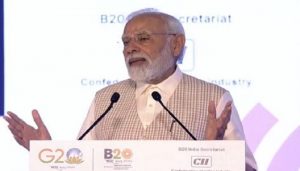As the B20 Summit India 2023 wrapped up in Delhi, the echoes of Prime Minister Narendra Modi’s words continued to resonate. Speaking to a gathering of business leaders, Modi didn’t hold back. He highlighted India’s role in shaping the global supply chain, advocated for customer care policies, and championed the green credit approach. But that’s not all. In his address, he turned the spotlight on technology’s frontier: Artificial Intelligence (AI) and cryptocurrency. Let’s delve into the insights of what PM Modi said about the development and regulation of AI in India.
Also Read: India Ranked 1 in AI Skill & Talent Among All OECD and G20 Countries

A Historic Gift: Mutual Trust Takes Center Stage
In a striking proclamation, PM Modi emphasized India’s gift to the world: mutual trust. He highlighted the legacy of trust that India has woven and beckoned business leaders to engage with the brave new world of technology, where AI and cryptocurrency are reshaping the landscape.
Also Read: OpenAI, Google, Microsoft, and Anthropic Unite for Safe AI
From Evolution to Revolution: PM Modi’s Call for Ethical AI
With the G20 Summit just around the corner, PM Modi’s call for a global framework for expanding “ethical” artificial intelligence (AI) is a game-changer. It’s a bold step towards leadership in the ongoing AI and cryptocurrency regulation debate. This shift signals India’s transformation from a passive stance on AI regulation to an active role in shaping regulations based on a “risk-based, user-harm” approach.
Also Read: Governing Ethical AI: Rules & Regulations Preventing Unethical AI

The Road to Regulation: A Shift in Paradigm
The winds of change have brought a paradigm shift in India’s approach to AI regulation. A mere whisper has turned into action, as evidenced by a consultation paper released by the apex telecommunications regulator, the Telecom Regulatory Authority of India (TRAI), which proposed a “risk-based framework” for regulating AI. This paper also suggested the creation of a global agency for the “responsible use” of AI through international collaborations.
Also Read: INDIAai and Meta Join Forces: Paves Way for AI Innovation and Collaboration
Global Leap: India’s Stand on Responsible AI
India’s call for “ethical” AI at the B20 Summit resonates globally. It suggests establishing a regulatory body overseeing the responsible use of AI, akin to international bodies for nuclear non-proliferation. This stance aligns with Sam Altman’s, founder of OpenAI, vision for international AI regulation, emphasizing the need for global convergence.
Also Read: Sam Altman’s High-Stakes Meeting with PM Narendra Modi: Charting India’s AI Future

Microsoft’s Blueprint: A Glimpse into AI Governance
Tech giant Microsoft has joined the AI governance dialogue, presenting “Governing AI: A Blueprint for India.” This blueprint proposes a safety-focused approach, outlining deployment in licensed AI data centers with continuous monitoring and protection post-deployment.
Also Read:
India’s Transformative Journey: An Opportunity Unveiled
Amid these developments, India stands at the threshold of a technological transformation, poised to harness innovation for economic growth. The nation’s policies are adapting to address privacy concerns, system biases, and intellectual property rights violations associated with AI.
Also Read: AWS and Accel Launch “ML Elevate 2023” to Empower India’s AI Startup Ecosystem
The Global Landscape: Diverse Approaches to AI Regulation
As the AI wave sweeps the world, nations are taking varied approaches to regulation. The European Union’s AI Act proposes a multi-tiered approach based on invasiveness and risk, while the UK adopts a more innovation-friendly stance.
Our Say
Prime Minister Modi’s insights at the B20 summit turn a new chapter for AI in India. His clarion call for “ethical” AI marks a turning point, heralding India’s newfound role as a leader in shaping the future of technology. As the world watches, India’s stance on cryptocurrency and AI regulation becomes a beacon of innovation, trust, and progress.




